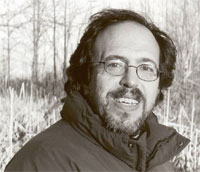|
|
|
LOOP QUANTUM GRAVITY: LEE SMOLIN [2.24.03] Science is a kind of open laboratory for a democracy. It's a way to experiment with the ideals of our democratic societies. For example, in science you must accept the fact that you live in a community that makes the ultimate judgment as to the worth of your work. But at the same time, everybody's judgment is his or her own. The ethics of the community require that you argue for what you believe and that you try as hard as you can to get results to test your hunches, but you have to be honest in reporting the results, whatever they are. You have the freedom and independence to do whatever you want, as long as in the end you accept the judgment of the community. Good science comes from the collision of contradictory ideas, from conflict, from people trying to do better than their teachers did, and I think here we have a model for what a democratic society is about. There's a great strength in our democratic way of life, and science is at the root of it. ~~~ It's only since the middle 1980s that real progress began to be made on unifying relativity and quantum theory. The turning point was the invention of not one but two approaches: loop quantum gravity and string theory. Since then, we have been making steady progress on both of these approaches. In each case, we are able to do calculations that predict surprising new phenomena. Still, we are not done. Neither is yet in final form; there are still things to understand. But the really important news is that there is now a real chance of doing experiments that will test the new predictions of these theories. This is important, because we're in the uncomfortable situation of having two well-developed candidates for the quantum theory of gravity. We need to reduce these to one theory. We can do this either by finding that one is wrong and the other right, or by finding that the two theories can themselves be unified.
LEE SMOLIN, a theoretical physicist, is concerned with quantum gravity, "the name we give to the theory that unifies all the physics now under construction." More specifically, he is a co-inventor of an approach called loop quantum gravity. In 2001, he became a founding member and research physicist of the Perimeter Institute for Theoretical Physics, in Waterloo, Ontario. Smolin is the author of The Life of The Cosmos and Three Roads to Quantum Gravity. LOOP QUANTUM GRAVITY Several years ago, I had the chance to move to Imperial College in London with the possibility of starting a research group. After I had been there a while, someone came to see me and said, "I represent some people who want to start an institute for theoretical physics. They want it to do fundamental work in things like quantum gravity, string theory, cosmology, and quantum mechanics and they have at least $100 million. What would you do? What fields would be included? How would you structure it? Who would be good to hire? Would you have a director? Would you pick somebody honored and wise and give him all the power to structure it, or would you just hire a bunch of young people out of graduate school and give it to them on a high-tech entrepreneurial model and let them run with it?" We talked about this, and he also talked to many people in these fields—Fotini Markopoulou-Kalamara, Carlo Rovelli, Chris Isham, Roger Penrose, and many others. Very important in these discussions was the structure. My view was that it's wrong to give one person all the power, because this is science, and science functions best when people are independent and there's a community. The proposed institute—the Perimeter Institute for Theoretical Physics, in Waterloo, just outside of Toronto—was particularly meant to be an incubator for innovative ideas about fundamental questions, and new ideas tend either to come from young people or from people who keep themselves young by constantly moving into new areas. We scientists constantly criticize each other, and we work best in an open atmosphere where anybody can criticize anybody, honestly and directly. You also want a supportive atmosphere, where people are generous and sympathetic about difficulties and failures. We talked about all these things, and over time the prospect began to look more attractive than staying in London. |
|
John Brockman,
Editor and Publisher
Russell Weinberger, Associate Publisher contact: [email protected] Copyright © 2003 by Edge Foundation, Inc All Rights Reserved. |
|
|Top|
|

